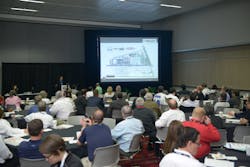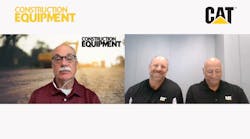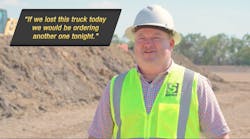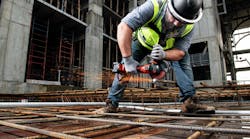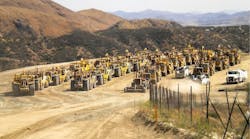Equipment Management & Maintenance
TUESDAY
9:30 - 10:30 am, T16
Oil Analysis – When the Oil Speaks, You Should Listen: Gain a clear understanding of the functions of lubricating oils. Know what labs are looking for when analyzing your samples: contamination, fluid degradation, wear, and fatigue. See actual evaluation practices applied to real world situations and know what to look for in a quality analysis program.
11:00 am - 12:30 pm, T25
Making the Case for Equipment Refurbishment: Learn to determine if a machine is a good candidate for refurbishment. Calculate how refurbishment increases the net present value of a piece of equipment. Use equipment refurbishment to save costs and still comply with GAAP.
1:00 - 2:30 pm, T36
Diesel Fuel Cleanliness & Tier 4 Requirements: Why Bulk Fuel Filtration is Needed in Today’s Diesel Engines: Identify common sources of upstream particulate contamination passed on by fuel providers to end users. Understand the importance of implementing a bulk fuel system preventive maintenance program. Identify sources of ASTM and ISO fuel quality information and contamination countermeasures.
3:00 - 4:00 pm, T46
Using Technology to Build a World Class Maintenance Program: Create an effective maintenance program. Monitor and modify operator behaviors that impact equipment health. Mitigate risk with condition monitoring.
WEDNESDAY
9:30 - 10:30 am, W15
What Contractors Need to Know About the Rental Industry: Discover how renting equipment can benefit your operations. Understand the industry outlook. Learn some of the new technologies being implemented in the rental industry.
1:00 - 2:30 pm, W36
Buy, Borrow, Lease, or Rent – It’s a Matter of Risk, Not Cost: Learn the most suitable way of deciding between buy, borrow, lease, or rent from a quantitative point of view. Understand the risks and opportunities presented by each of the financing alternatives, in addition to relative costs. Evaluate when buy, borrow, lease, or rent forms of financing make sense concurrently.
THURSDAY
9:30 - 10:30 am, TH15
The Future of Equipment Management: Changing Opportunities and Challenges: Learn the important, not just the urgent, trends in equipment management. Plan how to keep your priorities aligned. Use careful planning and strategy to successfully navigate and integrate change.
1:00 - 2:30 pm, TH35
Electrical Troubleshooting for Technicians and Mechanics: Learn how to avoid high electrical scrap cost due to swapping parts that are not faulty. Determine specific components and locations to test before disassembly. Understand how troubleshooting saves time and money.
3:00 - 4:00 pm, TH46
Fluids Management in Construction: Identify how and why fluid cleanliness will affect your fleet. Know how to specify, buy, and manage the five major types of fluids required. Understand the value of defining fluids management as a skilled, specialized function in your operation.
FRIDAY
9:30 - 10:30 am, F16
Tracking Key Equipment: Benchmarks and Market Trends: Learn equipment utilization trends. Understand how equipment aging affects the bottom line. Understand the impact of Tier 4 on resale pricing.
11:00 am - 12:30 pm, F26
Fleet Acquisition and Disposal in the Age of Technology: Know how to track equipment information pertinent to you and your business. Learn how early engagement of equipment solutions and technologies will impact total cost of ownership. Understand how to use telematics and maintenance records in regard to equipment disposal.
3:00 - 4:00 pm, F45
Driving Profitability & Data Capture with Maintenance Management Software Technology: Explore when and why to adopt a specialized, enterprise-wide Maintenance Management Program for their equipment. Evaluate equipment maintenance management workflows, best practices, and ROI considerations, and identify KPIs and industry benchmarks for maintenance and repair. Understand the structure and capabilities of a cloud-based, enterprise-wide system for data capture and analysis, and how to create and use electronic forms to ensure accuracy and reduce redundant manual data entry.
Earthmoving & Site Development
TUESDAY
9:30 - 10:30 am, T15
Recycling to Increase Profitability for Small Site & Demolition Contractors: Select the right equipment for effective recycling. Know why recycling is a necessity to make your bidding more competitive. Understand the role of impact crushing to produce 100 percent usable and compactable material.
1:00 - 2:30 pm, T35
Precision Excavating: The What and Whys of Vacuum Excavation: Understand what vacuum excavation is and its different methods. Learn how to apply it to business. Explore cost savings and ROI value of visually locating underground utilities prior to commencing mechanical excavation.
3:00 - 4:00 pm, T45
Equipment Safety for Operators: Mounting & Dismounting: Understand the “do’s and don’ts” of getting in and out of machinery, equipment, and vehicles safely. Learn how to evaluate your machinery and equipment for potential fall points. Learn the “Three Points of Contact” rule.
WEDNESDAY
9:30 - 10:30 am, W14
Equipment Operator Machine Walk-Around Inspections: Know what a walk-around inspection should include. Learn proper techniques and procedures to use during and after inspection. Learn troubleshooting tips for known problem areas.
11:00 am - 12:30 pm, W25
The Future is Now. Move More Dirt at a Lower Cost Using Machine Control: Understand how to get started with a base/rover grade management kit. Explore the benefits to utilizing machine control technology including cost. Discuss how to utilize telematics and data for increased savings and productivity.
1:00 - 2:30 pm, W35
GPS Integration & Your Equipment: Understand GPS technology trends and the benefits of using it on your equipment. Implement an effective GPS program in your company. Evaluate your return on investment.
THURSDAY
9:30 - 10:30 am, TH14
Growing Role of Compact Equipment in Earthmoving: Understand attachments for compact equipment and how they can help you be more productive. Discover best practices in the use of backhoes, excavators, loaders, and CTLs versus a compact excavator. Explore practical applications for compact equipment that can maximize your bottom line.
1:00 - 2:30 pm, TH34
Machine Control for Site Prep: When to invest in machine control technology. What excavating machines does machine control best “fit.” What current best practices are for utilizing this & future technology to its full capacity.
3:00 - 4:00 pm, TH45
Equipment Safety for Operators: Mounting & Dismounting: Understand the “do’s and don’ts” of getting in and out of machinery, equipment, and vehicles safely. Learn how to evaluate your machinery and equipment for potential fall points. Learn the “Three Points of Contact” rule.
FRIDAY
9:30 - 10:30 am, F15
Equipment Operator Machine Walk-Around Inspections: Know what a walk-around inspection should include. Learn proper techniques and procedures to use during and after inspection. Learn troubleshooting tips for known problem areas.
11:00 am - 12:30 pm, F25
The Future is Now. Move More Dirt at a Lower Cost Using Machine Control: Understand how to get started with a base/rover grade management kit. Explore the benefits to utilizing machine control technology including cost. Discuss how to utilize telematics and data for increased savings and productivity.
Technology
TUESDAY
11:00 am - 12:30 pm, T29
Extracting Big Results from Big Data, 3D Imaging, & the Internet of Things: Heavy ROI for Heavy Equipment: Get specific examples of businesses solving challenges with 3D technology and massive image sets. Understand the three essential steps to realize a healthy ROI from the equipment internet of things. See how to plan an end-to-end program that addresses the typical road blocks and drives success.
1:00 - 2:30 pm, T39
What the Intelligent Truck Means to Construction Materials Industry: Learn how telematics can help you address current market issues. Learn what telematics technologies are available and how they fit into your operations. Learn about the available business models for implementing telematics in your fleet.
WEDNESDAY
1:00 - 2:30 pm, W39
Autonomous Machines: The Future is Now: Learn the basic concepts of semi-autonomous and autonomous technology. See how it has been tested and used on real construction job sites. Discover the issues introduced by the technology in areas such as cost, safety, and employment.
THURSDAY
9:30 - 10:30 am, TH19
Using Augmented Reality Inspection & Workflow Apps to Improve Efficiencies: Understand how to amplify financial benefits with IoT integration. Learn how to evaluate solutions and suppliers and why wireless management matters. Understand ways to get information in the hands of the right people at the right time.
FRIDAY
9:30 - 10:30 am, F19
Heavy Hybrid Technology: Hear about the newest hybrid technologies. Learn the benefits of owning, maintaining, and overall ROI. Understand how hybrids stack up to conventional counterparts.
Cranes, Rigging, & Aerial Lift
TUESDAY
9:30 - 10:30 am, T14
Tapping into New Technologies at the Tappan Zee Bridge Project: Discover new style of enclosed jacking forms for bridge towers. See the setting of a main span structure with lifter. Learn new jacking and rolling techniques.
11:00 am - 12:30 pm, T24
What does Certification Have to do with Qualification?: Understand the role that certification plays in qualifying construction personnel. Know the latest federal and state requirements for certification and qualification. Learn how employers have put certification programs to good use.
1:00 - 2:30 pm, T34
Quality Crane Inspection: What is That?: Know how and when cranes must be inspected. Learn who can inspect cranes. Recognize the experience and certifications of a quality crane inspection company.
3:00 - 4:00 pm, T44
New in U.S. and Canadian AWP Standards?: Learn the latest mobile elevating work platform safe use standards. Understand the changes made in the latest ANSI and CSA design standards. Learn how they will influence the aerial work platform industry.
WEDNESDAY
9:30 - 10:30 am, W13
Responsibilities of Onsite Personnel for Cranes: Understand the roles that have been identified on a job site. Understand the responsibilities for each role. Understand the training requirements for people in those roles.
11:00 am - 12:30 pm, W24
Mechanics of a Super Lift: Understand the technical challenges associated with making super lifts with the world’s largest cranes. Learn how super lift plans are developed and checked for accuracy. Know how to develop a lift manual for a super lift.
1:00 - 2:30 pm, W34
AWP: Working Safely at Heights: Learn industry metrics on job site safety. Understand methods to improve job site safety, while maintaining job site efficiency. Learn about training options and importance of training.
3:00 - 4:00 pm, W43
Crane Assembly & Disassembly Checklists: Know how to select the appropriate crane for the job. Understand site preparation and pre-delivery inspection requirements. Know pre- and post- assembly roles and why everyone should be involved.
THURSDAY
9:30 - 10:30 am, TH13
The Case for Cranes and Telematics: Specialized Circumstances & Concerns: Hear real-world examples how improvements in adding telematic monitoring to fleets have positively effected the shop. Discover how operator monitoring and in-cab cameras can save fuel, improve safety, and lower costs. Mobile systems and I-pads assist with time tracking, production controls, and inspections.
11:00 am - 12:30 pm, TH24
Root Causes of Mobile Crane Incidents: Understand of the root causes of crane accidents. Know how behavioral training of people involved in lifting can make the difference in safety. Learn guidelines for proper maintenance, inspection and repairs.
1:00 - 2:30 pm, TH33
Planning Load Moves: ASME P30.1 and its Practical Application: Learn how to categorize load handling activity by risk level. Learn about the core elements in any load handling activity. Learn how to attend to all the details to ensure success.
3:00 - 4:00 pm, TH44
Working in the Blind—The Impact of Technology in a Claims Scenario: Learn about hook cameras and other technologies on the job site. Understand how plaintiffs may use information from crane operation. Receive best practices in crane technology.
FRIDAY
9:30 - 10:30 am, F14
Crane Assembly & Disassembly Checklists: Know how to select the appropriate crane for the job. Understand site preparation and pre-delivery inspection requirements. Know pre- and post- assembly roles and why everyone should be involved.
11:00 am - 12:30 pm, F24
Lift Director: Qualifications & Requirements: Know the responsibilities for lift directors in a variety of lifting environments. Identify the common elements that should be reviewed in lift plans. Learn the methods available to qualify lift directors to meet prevailing standards and best practices.
1:00 - 2:30 pm, F34
Mechanics of a Super Lift: Understand the technical challenges associated with making super lifts with the world’s largest cranes. Learn how super lift plans are developed and checked for accuracy. Know how to develop a lift manual for a super lift.
Safety & Regulatory
TUESDAY
11:00 am - 12:30 pm, T28
OSHA Compliance: How to Avoid Fines: Learn to prepare for an OSHA inspection, and know your rights and responsibilities. Know how to interact with an OSHA inspector, and what comprises an OSHA inspection. Understand how to respond to citations, fines, and penalties.
3:00 - 4:00 pm, T49
Tower Cranes: Rescue Preparedness: Learn how to develop your rescue plan for your operation. Know what to consider when selecting rescue equipment. Implement rescue training to improve the success of your rescue program.
WEDNESDAY
9:30 - 10:30 am, W18
Advanced Strategies for Oversized & Overweight Permit Harmonization: Identify highest priority issues in oversize and overweight hauling. Learn strategies to resolve each issue. Understand each stakeholder’s role in company operations to boost productivity.
3:00 - 4:00 pm, W48
AHA! How to Write an Acitivity Hazard Analysis: Know why an AHA is essential to a safe yet competitive fleet operation. Learn how to identify, evaluate, and prevent the hazards in your present situation. Learn the fundamentals of how to see with “Safety Eyes” to mitigate risk.
THURSDAY
9:30 - 10:30 am, TH17
Improving the Safety of Your Operators Through Technology: Use analytical data as proof points to improve operator performance. Learn best practices and how they change operator behavior. Identify emerging technologies that limit distractions and provide ROI.
3:00 - 4:00 pm, TH49
Developing an Empowering Culture of Safety: Analyze new situations for your safety implications. Combat business-as-usual thinking about safety. Learn how to get buy-in from your team.
FRIDAY
11:00 am - 12:30 pm, F28
Mitigating Fatigue Risk through Technologies and Safety Culture Solutions: Understand fatigue risk and how it manifests in an operation. Identify components of a successful Fatigue Risk Management System (FRMS). Learn how technology and fatigue monitoring fit into an FRMS.
1:00 - 2:30 pm, F37
Incident Investigation—Techniques for Getting to the Root Cause: Understand the steps involved in a thorough investigation. Explore best practices in analyzing data, a good investigation kit and reporting results. Learn how to define corrective measures to prevent reoccurrences.
3:00 - 4:00 pm, F48
Accountability – Taken or Held? Creating a Safety Culture that Really Works: Understand where the real power for positive safety culture change lies. Identify and capitalize on your available catalysts for safety culture change. Execute a deliberate approach to begin your safety journey with tools you can use right now.
Management - Business Best Practices
TUESDAY
1:00 - 2:30 pm, T37
Site Security: Protecting Your Assets & People: Understand current security trends and practices. Explore key elements of an effective crisis management plan. Learn what new technologies are available to help with your security solutions.
3:00 - 4:00 pm, T47
Understanding Equipment Costs – Finding the Sweet Spot: Learn what makes up ownership and operating costs. Understand the impact of your overall fleet budget in making your decisions. Evaluate ROI and know how can it help in the bidding process.
WEDNESDAY
9:30 - 10:30 am, W16
Equipment Replacement Decisions: Establishing a Standard: Define, understand, and manage the fleet replacement process. Understand the metrics: minimum life-cycle cost, reliability, availability, and utilization. Develop a relatively simple tool that combines performance metric scores into a single replacement ranking index.
THURSDAY
9:30 - 10:30 am, TH16
Optimizing Your Job Site: Overcoming Skilled Labor Challenges With Machine Controls & Data Analytics: Learn how technology can help address the shrinking workforce/labor issues in your industry. See how the advancement of construction equipment is improving operator productivity. Understand how machine data can better optimize results on the job site and improve ROI.
FRIDAY
9:30 - 10:30 am, F17
More than Machine Control: The Value of Connecting People, Information & Assets On & Off the Job Site: Lower operating costs through more accurate use of resources and assets and the reduction of unnecessary time and fuel costs. Improve productivity through optimizing personnel and equipment assets for improved cash flow. Improve accuracy, quality control, and quality assurance through the reduction of incorrect or outdated information.
Asphalt
TUESDAY
9:30 - 10:30 am, T12
Key Metrics for Monitoring Performance at Asphalt Plants: Understand key performance metrics to monitor an asphalt plant. Learn how to apply these metrics to improve plant operations.
11:00 am - 12:30 pm, T22
Machine Control Technology in Paving & Milling: Understand 2D vs 3D machine control and the benefits of both. Understand the limitations of machine control. Learn how machine control can increase productivity.
WEDNESDAY
1:00 - 2:30 pm, W32
Best Practices for Asphalt Compaction: Identify and work with factors affecting compaction. Understand each type of roller and how they are properly applied.
FRIDAY
1:00 - 2:30 pm, F32
Best Practices for Asphalt Compaction: Identify and work with factors affecting compaction. Understand each type of roller and how they are properly applied.
3:00 - 4:00 pm, F42
Best Practices for Milling & Profiling: Understand basic profiling machine operation, maintenance, and new innovations. Determine grade and slope control, and the effect of cutter tooth patterns. Learn controls to facilitate smoother cutting and more efficient profiling operations.
For the complete listing of education available at Conexpo 2017,
go to ConexpoConAgg.com/visit/education.
